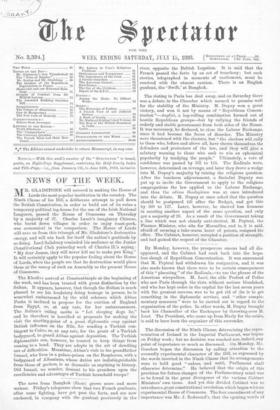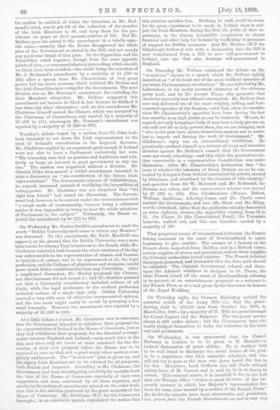The discussion of the Ninth Clause, determining the repre- sentation
of Ireland in the Imperial Parliament, was begun on Friday week ; but no decision was reached nor, indeed, any point of importance so much as discussed. On Monday, Mr. Goschen began the discussion by calling attention to the avowedly experimental character of the Bill, as expressed by the words inserted in the Ninth Clause that its arrangements were to hold good " unless, and until, Parliament shall otherwise determine." He believed that the origin of this provision for future changes of the Parliamentary mind was to be found in the great divergence of the various Cabinet Ministers' own views. And yet this divided Cabinet was to introduce a great constitutional revolution which began with an experimental House of Commons. The first amendment of any importance was Mr. 3. Redmond's, that the opening words of the section be omitted, of which the intention, in Mr. Red- mond's mind, was to get rid of the reduction of the number of the Irish Members to 80, and keep them for the pro- visional six years at their present number of 103. But Mr. Balfour gave his assent to the amendment in a totally oppo- site sense,—namely, that the House disapproved the whole plan of the Government as stated in the Bill, and not merely any particular detail of that plan. So the Opposition and the Pamellites voted together, though from the most opposite points of view,—a very unsatisfactory proceeding, which should, we think, have been avoided,—the result being the rejection of Mr. J. Redmond's amendment by a majority of 14 (280 to 266) after a speech from Mr. Chamberlain of very great power, but too much sarcasm, which irritated Mr. Sexton and the Anti-Parnellites into voting for the Government. The next division was on Mr. Heneage's amendment for excluding the Irish Members altogether. Mr. Balfour supported this amendment not because he liked it, but because he disliked it less than any other alternative ; and on this amendment Mr. Gladstone himself moved the Closure, which was accepted by the Chairman of Committees, and carried by a majority of 30 (241 to 211), whereupon Mr. Heneage's amendment was rejected by a majority of 31 (240 to 209).



































